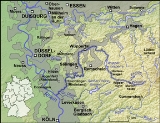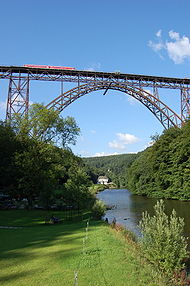
Wupper
Encyclopedia
The Wupper is a right tributary
to the Rhine river in the state of North Rhine-Westphalia
, Germany
. Rising near Marienheide
in western Sauerland
it runs through the mountainous area of the Bergisches Land
Berg County and enters the Rhine at Leverkussen, south of Düsseldorf. Its upper course is called "Wipper".
On its course of about 113 km the Wupper traverses the city of Wuppertal
where the Schwebebahn
or floating tramway for 10 kilometers runs over the river. According to a popular local story, on 21 July 1950 a young elephant named Tuffi
jumped into the Wupper from the Schwebebahn.
It is crossed by the highest railroad bridge in Germany near Müngsten, between Remscheid
and Solingen
. A few miles further down, Schloss Burg
is located on a hill overlooking the river.

With this the Wupper enabled an industrial expansion of the Wuppertal or Wupper Valley during the 18th, 19th and early 20th century, similar to that of Silicon Valley today. Wupper Valley is one of world's first industrialized regions and empowered a.o. the Ruhrgebiet
.

Tributary
A tributary or affluent is a stream or river that flows into a main stem river or a lake. A tributary does not flow directly into a sea or ocean...
to the Rhine river in the state of North Rhine-Westphalia
North Rhine-Westphalia
North Rhine-Westphalia is the most populous state of Germany, with four of the country's ten largest cities. The state was formed in 1946 as a merger of the northern Rhineland and Westphalia, both formerly part of Prussia. Its capital is Düsseldorf. The state is currently run by a coalition of the...
, Germany
Germany
Germany , officially the Federal Republic of Germany , is a federal parliamentary republic in Europe. The country consists of 16 states while the capital and largest city is Berlin. Germany covers an area of 357,021 km2 and has a largely temperate seasonal climate...
. Rising near Marienheide
Marienheide
-History:The first documentary mention of the place was in 1417 " in a sales document is called Heydenreich of our dear Mrs. Knecht on the Mergenheyde " -History:The first documentary mention of the place was in 1417 " in a sales document is called Heydenreich of our dear Mrs. Knecht on the...
in western Sauerland
Sauerland
The Sauerland is a rural, hilly area spreading across most of the south-eastern part of North Rhine-Westphalia, in parts heavily forested and, apart from the major valleys, sparsely inhabited...
it runs through the mountainous area of the Bergisches Land
Bergisches Land
The Bergisches Land is a low mountain range region within the state of Nordrhein-Westfalen, Germany, east of Rhine river, south of the Ruhr. The landscape is shaped by woods, meadows, rivers and creeks and contains over 20 artificial lakes...
Berg County and enters the Rhine at Leverkussen, south of Düsseldorf. Its upper course is called "Wipper".
On its course of about 113 km the Wupper traverses the city of Wuppertal
Wuppertal
Wuppertal is a city in North Rhine-Westphalia, Germany. It is located in and around the Wupper river valley, and is situated east of the city of Düsseldorf and south of the Ruhr area. With a population of approximately 350,000, it is the largest city in the Bergisches Land...
where the Schwebebahn
Schwebebahn Wuppertal
- Current modernisation :The Wuppertal Schwebebahn nowadays carries up to 82,000 passengers a day through the city. Since 1997, the supporting frame has been largely modernised, and a lot of stations have been reconstructed and brought technically up to date...
or floating tramway for 10 kilometers runs over the river. According to a popular local story, on 21 July 1950 a young elephant named Tuffi
Tuffi
Tuffi was a female circus elephant that became famous in Germany in 1950 when she jumped from the suspended monorail in Wuppertal into the river below....
jumped into the Wupper from the Schwebebahn.
It is crossed by the highest railroad bridge in Germany near Müngsten, between Remscheid
Remscheid
Remscheid is a city in North Rhine-Westphalia, Germany. It is, after Wuppertal and Solingen, the third largest municipality in Bergisches Land, being located on the northern edge of the region, on south side of the Ruhr area....
and Solingen
Solingen
Solingen is a city in North Rhine-Westphalia, Germany. It is located on the northern edge of the region called Bergisches Land, south of the Ruhr area, and with a 2009 population of 161,366 is the second largest city in the Bergisches Land...
. A few miles further down, Schloss Burg
Schloss Burg
Burg Castle , located in Burg an der Wupper , is the largest reconstructed castle in North Rhine-Westphalia, Germany and a popular tourist attraction...
is located on a hill overlooking the river.

Waterpower
From the 15th century on, the Wupper and its many rivulets and creeks gave birth to hundreds of workshops, mills and factories alongside their streams. First using the water to dye, bleach and wash canvas and cloth, later using the water to power machines, or to transport waste.With this the Wupper enabled an industrial expansion of the Wuppertal or Wupper Valley during the 18th, 19th and early 20th century, similar to that of Silicon Valley today. Wupper Valley is one of world's first industrialized regions and empowered a.o. the Ruhrgebiet
Ruhr
The Ruhr is a medium-size river in western Germany , a right tributary of the Rhine.-Description:The source of the Ruhr is near the town of Winterberg in the mountainous Sauerland region, at an elevation of approximately 2,200 feet...
.

Other
- The Wupper is cited in two German sayings: "Über die Wupper gehen" - "To go over the Wupper" meaning going bankrupt, going into jail or going to die, and "Wir wuppen das" -"We'll whoop that" meaning We'll get that done.
- Else Lasker-SchülerElse Lasker-SchülerElse Lasker-Schüler was a Jewish German poet and playwright famous for her bohemian lifestyle in Berlin. She was one of the few women affiliated with the Expressionist movement. Lasker-Schüler fled Nazi Germany and lived out the rest of her life in Jerusalem.-Biography:Schüler was born in...
wrote the drama Die Wupper.
- It's possible that the 1928 American musical Whoopee and the famous title song Makin' whoopee!, is inspired by the German saying "Wir wuppen das". Texter of the song was Gus KahnGus KahnGustav Gerson Kahn was a musician, songwriter and lyricist.-Biography:Kahn was born in Koblenz, Germany in 1886. The family emigrated from there to the United States and moved to Chicago, Illinois in 1890...
who was born in Koblenz, about 100 kilometers from Wupper Valley. He must have known this saying.

